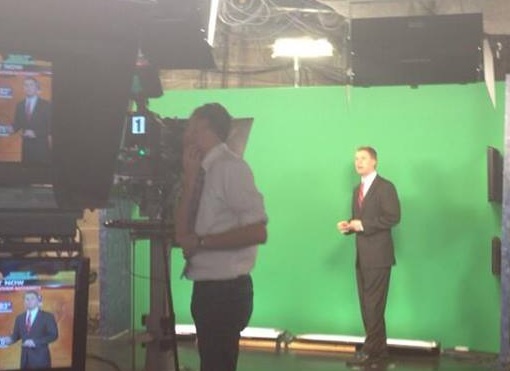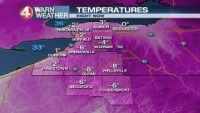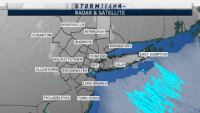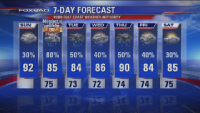To The Students Of Penn State University And The Campus Weather Service:
Odds are good you have no idea who I am, but I was once like you. I graduated from Penn State 11 years ago with a Bachelor of Science in Meteorology from Penn State. I was a member of the Campus Weather Service. I was both on camera and worked behind the scenes at Weather World. I learned a lot at Penn State just like you, and I really enjoyed my last two years there.

I worked in broadcast meteorology for 10 and 1/2 years. I worked in three different cities, and I’ve worked just about every shift there is. I interned every summer during college (once for the National Weather Service and twice at two different Cincinnati TV stations). Additionally, I had a path to a career with the National Weather Service, but the opportunity just wasn’t right for me. I’ve recently earned an MBA (Masters in Business Administration) from Xavier University and work into the business world now as an analyst.
I tell you these things not to brag or boast but to tell you some things I wish I would have known 10 years ago about meteorology and give you a frame of reference. No one sat me down and told me how the meteorology industry works or the good and bad within it. When you’re focused on differential equations, atmospheric dynamics, finding a job, and having a social life…it’s easy to not have a focus on your career or what the next 10 years look like. I’m here to offer some advice with that.
I’ve come up with 15 things you need to know about the future, and they are all important. What I say may not carry a lot of weight with you because you’ve never heard it or experienced it before; take a leap of faith that what I say is more right than it is wrong. Let’s talk.
- Your #1 goal in your life and career is to be happy and successful. Happy and successful. Happy and successful. Happy AND successful. It’s so important that it requires repeating. You should always be or be working to be happy and successful. If the job offer you got doesn’t make you happy and successful, don’t accept it. If your first job doesn’t make you happy and successful, move on as soon as possible. If any aspect of your life doesn’t make you happy and successful, it’s time to move on.
- Study who is advancing and succeeding in meteorology and figure out why that is. When I graduated from Penn State, the boss of my first job said he hired me because I was a Penn State graduate, and he thought it was a good school for meteorology. What got me my second job? Being a Boy Scouts of America Eagle Scout helped me stand out. What got me my third job? The fact that I interned with my supervisor, and he liked the quality of my presentations and interest in data. Fast forward a couple of years into my third job, and I found myself wanting to advance. I saw people in my industry with half of my experience getting higher-exposure, more senior, and better paying jobs…and I wasn’t moving. I thought that my experience and education would be helpful to advancing.
Until I started an MBA, I didn’t really get business. When you graduate from Penn State with a meteorology degree, you don’t know much if anything about business, and this is unfortunate. Thankfully, I can give you some insight. Successful companies create value for their customers. They do so by having a competitive advantage, and hopefully it’s a sustainable competitive advantage (one that other companies can’t replicate). Companies also care about profit, which is revenue (income) minus costs. How do companies make more profit? They either increase their revenue or decrease their costs. This helps retain their shareholders, stakeholders, and investors (people that own stock or a share of the company and expect a return on their investment).
So let’s jump back to meteorology and the companies that depend on meteorologists. Take your pick on which vertical you want. Government, public, or private sector? It doesn’t matter. Now assume you’re the boss at one of these companies. Your investors want you to make more profit every year. You can only increase your revenue so much; your budget is only so big. You can cut costs, and you may even be incentivized by your company to cut costs. How can I cut costs? Salaries take up a big part of the budget, so maybe you look there. Experienced employees cost more, and less experienced employees cost less. Is it worth getting people with less experience? Some bosses will say yes, and others will say no. What kinds of people are willing to work for less? Really think about this question, then go back to the original question: why are the people who are advancing actually advancing? What about them gives them a leg up? Then look at yourself against this crowd. Can you have their same success? Can you get the education or knowledge they have…or is it something you can’t change? I remember getting advanced to a second round of a National Weather Service job years ago. I called the meteorologist-in-charge of the office, and he told me I wasn’t likely to get the job because he had two military veterans in the list of candidates. Could I realistically be a military veteran? I couldn’t…at least not easily. Perhaps there were other candidates who – after interviews – were willing to take a lower salary, and I wouldn’t have gotten the job (all veteran qualifications aside). The moral of the story here is that some people advance and get jobs for the right reasons, and some people get jobs for the wrong reasons. Sometimes you won’t get the job even if you’re the most qualified candidate.
- METEO 473 is the most important class you’ll take at Penn State. Remember that course you took on processing weather data and transforming it into an analysis? That’s the most important class you take at Penn State. Pick any large company that doesn’t employ meteorologists. If you’re struggling, think of Google, Macy’s, Apple, or Microsoft. These companies spend MILLIONS if not BILLIONS of dollars each year in research and development on products and services. You know what they use to make decisions? Data. Now go back to meteorology and rope in the comments I made about sustainable competitive advantage above. What are YOU going to do to stand out? Present the temperature map with a brighter and bubblier personally than anyone else? Please. Present the same information that everyone else has access to from a vendor? Please. You’re going to stand out because of what you can do with data. You could present the mold and pollen count, but can you automate a process to ingest that data into a computer so you can save time and avoid the potential for typos? Can you predict what tomorrow’s pollen and mold count will be. You can do a statistical analysis on it. Use a linear regression, and you’ll be surprised how easy it is. To stand out, you have to know where to find data that few can find, know how to process it and automate processes, and predict what others can’t. If you don’t know how to get the data you want, figure it out, and don’t give up!
- Stop looking like everybody else and be different. One of the worst parts about meteorology today is that everybody looks the same. Here’s your forecast, right?



I would guess the phrases “good morning”, “those/these temperatures”, “just a few showers”, “weekend is always in view”, and other cliche phrases are peppered throughout the presentation. BORING. When you’re learning to present the weather, you shouldn’t be emulating other meteorologists and just learning to do what they do. You should be learning to talk about the weather in your own words with confidence. What are YOU going to present that isn’t just the same thing as everyone else in town? What’s your trademark? As I stated above, data and analysis is your best and easiest way to stand out. - Minimize your “greenness”. I get it. You’re in college and soon to be entering the workforce. You’re excited. You want to leave out the dream of being a meteorologist. You’ve followed the weather since you were a kid. You’re wanting to hit the ground running, and you’ve got ideas. But don’t be a sucker. Of course your boss wants you to work all of the time and give 150%, especially if it’s not costing your boss a dime. As you get older and especially as you have more commitments (a significant other, a family, a child, etc.), you’ll see the importance of a work-life balance. You don’t want to spend your life at work. Talk to your parents or older mentors about limiting their time at work before you start working. Meteorology is already a industry that essentially requires you to look at the weather when you’re not working. 40 hours a week of meteorology is plenty, especially if part of it is spent in the cold, heat, or elements.
- When you graduate, you don’t have to go into meteorology. No one actually tells you this, but you don’t have to take a job in meteorology. You can do whatever you want for a career. A meteorology degree gives you many important life and career skills, including – but not limited to – critical thinking, problem solving, ability to use technology, and programming. Those are the skills you need to get just about any good job. You can market those skills and get into a lot of industries.
- The hours of meteorology suck and will have an impact on your life. You may have heard people complain about how “boring” 9am to 5pm Monday through Friday jobs are; I suspect those people have never worked the shifts that a meteorologist does. National Weather Service meteorologists that aren’t in management work different shifts; in other words, you may work overnights one day, evenings for another shift, midday for another shift, and then mornings through early afternoons for another shift. If you work in television and do weekday mornings, you’re likely up at 1-2am five days a week. If you’re working evenings in television, you’re in at 2pm and out just before midnight. If you’re working weekends in TV, your schedule is all over the place; in fact, many weekend meteorologists in TV work all of the morning and evening shifts. As a college student, it is highly likely that you have never had a job that required you to work crazy hours, so you don’t know the impacts it will have. The idea of working the weekday morning shift looks easy, but it will wear on you. Doing double shifts or early morning shifts isn’t too taxing on your body if you only do it a couple of days or even a week. After about two weeks, you’ll be tired. After a month, you’ll be exhausted. After 5 years of doing it (like I did), you’ll likely have health effects. You can cope with coffee and naps, but these are coping mechanisms. Coffee plus an unsettled mind due to getting up in the middle of the night don’t mix well. Your lack of sleep day after day becomes a compound issue; being tired one day makes you more tired the next, and after months and years of doing this, your mental and physical health easily slide. Now layer on the other pieces of life. You’re taking your personal time to nap. You’re tired, so will you make it to the gym? Now say you’re married with kids; you’re going to tell your your significant other and kids you have to go to bed at 5pm or work holidays and weekends? They won’t fully understand your shift or what it’s doing to you, and yet you’re still expected to be there and alert for your family.
- Advancing in meteorology often requires moving. This may not be a problem for you, but suppose you take a job then can’t advance. You may have signed a contract with a no-compete clause, so you can’t just work across the street. That means you’ll have to move. Then say you want to work a better schedule in a couple of years. Can you just advance to the new schedule you want because you are the best forecaster statistically? It doesn’t work like that. You’ll have to move. Then suppose your new employer is grooming you for a better job, but then you realize it requires going to a new town. At some point, you’re going to have to ask yourself: is it worth all of this moving? Moving often means finding new friends and moving your family along with you.
- Meteorology is a better hobby than it is a career. Meteorology is a public facing job. You get to tell everyone the weather. That means everyone, including the worst of the worst and the best of the best. When you forecast 2-4″ of snow, there will be trolls ready to say they got 4.1″ and “it must be nice to be wrong 70% of the time and keep your job.” Also, forecasting the weather is like drinking from a fire hose. There’s an endless supply of models to review, and you have to make decisions that impact people’s lives. It’s a lot to take on, and there will always be grief. Some people are mean; if you’re in the public eye, some will make fun of your looks, some will insult your knowledge, and some will even attack your race, weight, or gender. You can look at models all you want working out of the weather industry and without the attacks. Plus, how long do you want to spend your mornings, nights, weekends, and holidays away from your family? How long do you want to work in the cold, snow, heat, and other weather elements? Regardless of where you work, you have to think about how your job will impact the quality of your life.
- Be careful from whom you take advice. If your mentor is young and inexperienced, they likely haven’t been in meteorology long. You want to talk to mentors to have been in their business for many, many years. They have seen a few things. They’ve worked the shifts, they’ve seen people fired on the spot, and they’ve seen the industry trends play out. People that have been in the business a long time get “the long game.” Also, be careful getting your advice from senior or chief meteorologists that have been in their position for a long time. A chief meteorologist that has been in his or her spot for a long time likely hasn’t worked the more physically demanding early morning or “doubles on the weekend” shifts…or at least remember working them…or did the shift before the layers of mutli-platform demands.
- You’ll probably have to get a masters degree down the road. This is not what you want to hear with building student debt, but you’ll probably have to get another degree in the future. I don’t know of a company with meteorologists that will pay for you to get a masters degree, so you’ll likely have to pay for this degree out of pocket. Why do I say you’ll need a masters degree? Because if you want pivot to another career, you’ll likely need to prove to your future employer that you’re qualified and “not a meteorologist.” The National Weather Service also wants the best candidates, and your education matters and increases your odds of getting hired. Budget accordingly, and pace yourself.
- Research your employers extensively. Before you sign on the dotted line for a job, you should research your employer. What kind of company are they? What’s the culture there? What are employees saying about the company? Have they recently gotten in trouble or hot water? Are they ethical? Are they fair? Do they treat their employees well? Do your research so you work for the right employer. Know that your employer may also be acquired or merge with another company. As news of that breaks, research the acquiring company. If they aren’t a good fit, it’s time to move on.
- Your looks may matter. It’s not right, it’s not okay, but it’s reality. If you’re in a public-facing role, your “beauty” comes into play. I’m not here to judge you, but some will. You’re far more likely to be judged based on your looks than forecast accuracy.
- Your opportunity cost may be better outside of meteorology. Opportunity cost is the loss of potential gain from other alternatives when one alternative is chosen. Suppose you go into meteorology. What’s the average salary of a meteorologist in their first job? I remember getting an offer to work as a broadcast meteorologist in the Midwest for $18,500 a year. As a college student, that may seem like a lot, but that’s not a lot of money. The poverty line for a single person is $12,140. I didn’t take that offer, but know that it takes a while to make a great salary in meteorology.Now consider a career in business or another field. What’s the average salary for a business person in their first job? It’s likely higher than a career in meteorology. Either way, you have to research. It’s not all about money either; which path gives you want you want in life faster?
- Your dream changes, not ends. Being a meteorologist is a dream, but the odds that you change careers in your life is high. You need to be prepared for change. People lose their jobs or get fired. What are you going to do if that happens? You likely have rent and loans to pay. How are you going to pay your debts? You’ll want job security once you have a job, especially if you have a family. Do you get your forecast on your smartphone or TV? If not, how many of your friends do? This should tell you about trends in meteorology, where people are getting their forecast, and how much people care about the quality of forecasts. Don’t ride out the storm until it ends; make moves before the storm hits.
I hope you find what I say relevant and beyond what others have told you. I encourage you to think a lot about your career choices, who you want to work for, who you don’t want to work for, and what will – above all else – make you happy and successful.
Warmly,
Scott Dimmich

Excellent post Scott! Truer words were never spoken in so many ways!
My oldest son once got a job because he too was an Eagle Scout. I even got a job (I did not go to college) because I was a volunteer in Cub Scouts.
I am 72 and in later years I also discovered with all of my experience in accounting and other office positions, companies were more likely to hire younger candidates with no experience because they didn’t want to pay for the those with experience. I would have been willing to take the lower pay too, but wasn’t offered the opportunity.
The only point you might have missed (and maybe it isn’t that relevant in meteorology, is that many times it’s not what you know but who you know. I think that bothers me the most.
Again, great post and thanks for helping those who need to hear these things.
Scott, You’re brilliance continues to astound me! You may never know, but, students may be able to apply your words of wisdom either now or later on after they graduate.